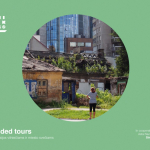
A set of tools and methods for inclusive neighbourhood regeneration was developed for the historical Šnipiškės neighbourhood (Vilnius) and launched in cooperation with its residents in 2o12-2o15. It aims at developing and strengthening local solidarity network through cooperative actions in public space. Laimikis main principle is to bring people together by activating public spaces in the neighbourhood and building sustainable initiatives. Despite some of the tools are very simple and evident (like notice boards), in many neighbourhoods they are missing. Also, we widely applied arts-based participatory research approach. Previously to implementing these tools Laimikis team made a field research in the neighbourhood that took 4,5 months. Also, we have rented a flat to leave in Šnipiškės during this period of time.
Sprendinių dėžutė, skirta kaimynysčių gaivinimui, buvo suformuota Laimikis.lt grupei bendradarbiaujant su medinių Šnipiškių gyventojais ir seniūnija nuo 2012 metų. Šių kompleksiškai taikomų įrankių paskirtis – lokalaus pasitikėjimo tinklo (bendruomenės) stiprinimas per vietos gyventojus suburiančius veiksmus viešojoje kaimynijos erdvėje. Nors dalis sprendimų yra labai paprasti (pvz. skelbimų lentos arba fb grupės), bet jų sėkmingas įdiegimas reikalauja papildomų sąlygų – prišingų atveju šie instrumentai nėra naudojami gyventojų. Prieš įdiegdami šią įrankių dėžute kartu su šnipiškiečiais, buvome atlike 4,5 mėnesius trūkusį lauko tyrimą. Ir dar – mes patys apsigyvenome Šnipiškėse.

We are happy to cooperate with our friends, colleagues and passers-by, developing new ideas for urban spaces! This year was intensive and we wish you happy holidays and an inspiring brand New Year:)
.
Šie metai buvo turiningi ir įkvepiantys :) Buvo džiugu kooperuotis su jumis kartu vystant ir įgyvendinant idėjas miesto erdvėms, susirasti naujų bendražygių ir palaikyti ryšį su senaisiais:) Linkime visiems laimingų metų ir švenčių, nuo kurių darosi šviesiau:)
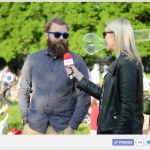
This year Burbuliatorius, an initiative which aims to revitalise forgotten public spaces by bringing citizens together for non-commercial activities every second Monday during summertime, celebrates its 7th season. Laimikis.lt launched this event in 2009, and since that time 58 events have been run. Burbuliatorius takes place at the same day in 17-20 cities and villages around the world, and the idea was born in Vilnius. We share several videos and reportages on it, and thank to the cameramen, journalists and photographers who help to spread this initiative!
.
Šiais metais Burbuliatorius švenčia septintąjį sezoną. Nuo 2009 metų ši iniciatyva, kurios tikslas – gaivinti miesto erdves kas antrą pirmadienį suburiant miestiečius primirštose viešosiose erdvėse nekomerciniam laisvalaikiui, jau 58 kartus subūrė Vilniaus gyventojus. Burbuliatorius vienu metu vyksta 17-20 miestų ir kaimų, o pirmą kartą buvo surengtas Lukiškių aikštėje.

A second part of the “Co-urbanism” catalog has just been issued. It’s a collection of texts, which explore the forms of citizens participation in urban development. It reflects upon the obstacles, active citizens meet in their practice, and tactics of negotiation, emerging forms of collective urban experience and the experience of urban space. Here you will find a content and links to some of the papers. And a text of introduction in Russian.
.
Antrasis Co-urbanism katalogas – tai tekstų, skirtų miestiečių dalyvavimui miesto vystyme, rinkinys. Jo autoriai analizuoja problemas, su kuriomis susiduria aktyvūs miestiečiai savo praktikoje, o taip pat šių problemų sprendimo taktikas, apžvelgua besiformuojančias kolektyvines miesto praktikas ir viešųjų erdvių formavimo tendencijas Europos miestuose. Čia mes skelbiame įvado tekstą [ru], turinį [eng] nuorodą į katalogą [eng, ru, by].
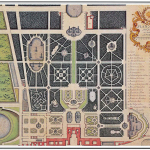
Co-urbanism map is a tool for collecting and analyzing the cases and methods in the field of participatory urbanism. The platform was developed as a part of Co-urbanism project, run by Minsk Urban Platform (Belarus) and Laimikis.lt (Lithuania). We see it not only as an analytical tool (as map is instrumental in identifying the types of urban problems, the active urban groups deal with, and types of solutions, which are developed in different regions), but also as a networking tool, helpful in exchanging the information on ongoing initiatives in the region. Therefore we invite every active urbanist to contribute into this growing map, by publishing the profiles of their initiatives and links to their sites.
.
Šis žemėlapis – pirmas bandymas imti kartografuoti regione plėtojamas iniciatyvas, analizuojant bendras miesto problemas, į kurias reaguoja aktyvūs miestiečiai ir priemones, kuriomis šios problemos yra sprendžiamos. Pirmieji pagal atvirą kvietimą surinkti iniciatyvų profailai buvo eksponuojami jungtinėje parodoje Minske, Urbanistinio festivalio metu (2o14 lapkritis 10-16), o šiuo metu žemėlapis pildomas toliau.

In her paper on e-democracy, Irma Rybnikova investigates the mechanisms of constructing the powerless citizen, which are applied in the e-governance model. The English version of this text is published in the “Co-urbanism” catalog, while we publish version in Lithuanian.
.
Savo tyrime, skirtame elektroninės demokratijos įgyvendinimo formoms, Irma Rybnikova analizuoja bejėgio piliečio konstravimo mechanizmus – išvirkštinę dalyvavimu paremto miesto vystymo modelio pusę.
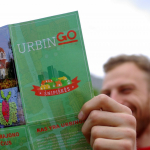
URBINGO is an urban game and alternative guide to the changing neighbourhoods. This game was developed as a matrix for collecting and arranging neighbourhood stories and changing material culture, turning it into actively used archive. It is a tool for activating the interest for the rapidly changing neighbourhoods and their stories. The 1st edition of Urbingo is dedicated to the wooden neighbourhood Šnipiškės (Vilnius), which faces a redevelopment pressure and lives through rapid changes.
.
Žaidimas-gidas URBINGO kviečia tapti kaimynijų paslapčių atradėjais ir leistis į naujų vietų ir patirčių medžioklę! Įdomūs faktai ir užduotys paskatins atidžiau dairytis paslėptų detalių net gerai pažįstamame rajone. Urbingo tikslas – paskatinti aktyvų miesto rajonų pažinimą ir miestiečių dalyvavimą, ieškant smagių vaizdų ir vertingos informacijos apie savo ir kitus rajonus. Prie žaidimo-gido vystymo galite prisidėti ir jūs, siūlydami naujus taškus žemėlapyje.

HubCamp is the first part of Co-urbanism 2015 event, which aims to develop the model of effective communication and cooperation between citizens groups, city stakeholders, municipality and other governmental units – seeking to foster citizens participation in decision making processes. The event brought together tactical urbanists and green activists, sociologists, geographers, architects and urban planners, representatives of municipality and other governmental units, and social innovators. We publish a set of video presentations, made at Co-urbanism Hub Camp. Vilnius, 2015.
.
HubCamp – pirmoji Co-urbanism renginių serijos dalis, skirta kartografuoti bendrą lauką praktikų, galimybių ir problemų, susijusių su bendradarbiavimu ir komunikacija tarp miesto erdves formuojančių skirtingų interesų grupių. Skelbiame Hub Camp pranešimų seriją, kurios dalyviai fokusavosi į dalyvavimu paremto miesto planavimo bei kūrybinių sąveikų tarp skirtingų visuomenės interesų grupių ir institucijų klausimus.
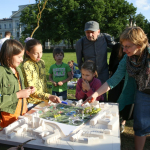
After a series of architectural contest for Lukiškių square, we arranged an Open square workshop, encouraging place users to share their needs and develop the vision on the sqare. The workshop aims to develop a participatory tool, based on the open discussions with the active users of the public space, and applicable for the professional development of architectural projects. Alongside with Street blogging sessions, interviews and micro-protest series, which took part on the square, this workshop is one of the participatory tool for including the users of the place into the open dialogue about the future of the square. We hope, that the inclusion of public discussions in the process of the development of the architectural vision will become a part of architectural practice here in Lithuania. This workshop is a part of “Co-urbanism” initiative and series of events, which aim to develop an effective model of cooperation between various citizens groups, city administration and stakeholders.
.
Trečioji renginių serijos “Co-urbanism” dalis – atviros dirbtuvės Lukiškių aikštėje. Dirbtuvių metu aikštės naudotojai kartu su architektais išgrynins miestiečių poreikius ir vizijas. Tai pilotinis projektas, kuris leis mums suprasti, kaip miestiečių nuomones ir pageidavimus paversti vizijos formavimo įrankiu, kuriuo naudosis architektai [o taip pat, kaip šis įrankis galėtų pagelbėti formuluojant architektūrinių konkursų sąlygas].

We are happy to present our guest lecturer, Carles Baiges Camprubí, an architect and urban sociologist, a member of the architects cooperative LaCol and the housing cooperative La Borda. His lecture “Bottom-up urbanism: housing, social economy and public space” is a part of the program of “Co-urbanism: points of cooperation in the city”. We publish a video-record of his public lecture and a series of projects, in which our lecturer is involved and some of which were presented in his public lecture.
.
“Co-urbanism: bendradarbiavimo jungtys mieste” programos dalis – kviestinio lektoriaus Carles Baiges Camprubí paskaita “Bottom-up urbanism: housing, social economy and public space”: Nacionalinė dailės galerija, 2o15 o6 o6, 16.3o. Skelbiame seriją projektų, su kuriais dirba mūsų lektorius! Iš projektų akivaizdu, kad verta apsilankyti ir aktyvistams, ir architektams, ir miesto administracijos atstovams.
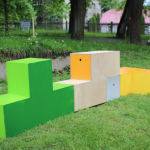
Two last weekends of May are reserved for the a series of Open code urban furniture workshops in 4 Vilnius neighbourhoods: 4 urban furniture sets, 4 neighbourhoods, 4 different scenarios of use. Urban furniture is not only a tool for configuring new community spaces, but also a tool for revealing the logics of neighbourhood places. The first workshop of this series took place at Antakalničių sodas (Antakalnis) and Šnipiškiečiai (wooden Šnipiškės) on 2015 June 23 and 24. And is going to take place in Lazdynai and šv. Stepono street on June 30 and 31. Each space is different from the others: while in Antakalnis there is the first community garden, located in the historical part, wooden Šnipikės experience the redevelopment pressure, Lazdynai is a residential area built in the Soviets, and šv. Stepono is an inner yard in the old town of Vilnius!
.
Paskutiniai du gegužės savaitgaliai skirti dirbtuvėms kaimynijose, kur kartu su vietos gyventojais įkūriame po vieną lauko baldų komplektą, pritaikydami jį bendruomenės poreikiams. Vietą ir baldo konfigūraciją atviro kodo baldo įrengimui siūlo vietos gyventojai. 4 atviro kodo baldų komplektai, 4 rajonai, 4 skiritingi naudojimo scenarijai. Tokiu būdu atviro kodo miesto baldai tarnauja ne tik kaip įrankis atvirai bendruomeninei erdvei, skatinančiai komunikaciją ir dalinimąsi, sukurti, bet ir kaip tyrimo metodas, leidžiantis suprasti bendruomeninių erdvių funkcionavimo principus bei sukartografuoti rajonų gyventojų poreikius.

“Co-urbanism: points of cooperation in the city” is an initiative, which aims to develop a model of effective communication and cooperation between citizens groups, city stakeholders, municipality and other governmental units – seeking to foster citizens participation in decision making processes. Co-urbanism event series embraces public formats, such as workshops, HubCamp, guest lectures, brainstorms, open discussions. But it also includes a research and think tank, focused on the methods of activism in the post-soviet region (starting with Lithuania and Belarus). The initiative brings together active residents, urban artivists, urbanists and architects, municipal workers, representatives of NGO sector and govermental organisations to share the experience of cross-sectorial interaction and to develop a toolbox for productive co-operative development of city spaces. Curator: Jekaterina Lavrinec (Laimikis.lt), in cooperation with Minsk Urban Platform. The event takes place in Vilnius on June 5, 6, 8, 2015.
.
“Co-urbanism: bendradarbiavimo jungtys mieste” iniciatyvos tikslas – iškristalizuoti skirtingų visuomenės interesų grupių ir institucijų sąveikos modelius ir efektyvios komunikacijos formas vystant miesto erdves, ir taip sudaryti palankias sąlygas miestiečių dalyvavimui vystant miesto erdves. Renginių ciklas apima: dirbtuves, HubCamp pranešimus, atviras diskusijas, smegenų šturmus ir dirbtuves, kurių metų skirtingų sričių atstovai kooperuojasi diskutuodami ir spręsdami miesto erdvių vystymo klausimus. Renginio iniciatorė: dr. Jekaterina Lavrinec (miesto žaidimų ir tyrimų laboratorija Laimikis.lt). Renginys organizuojamas bendradarbiaujant su Minsko urbanistine platforma.